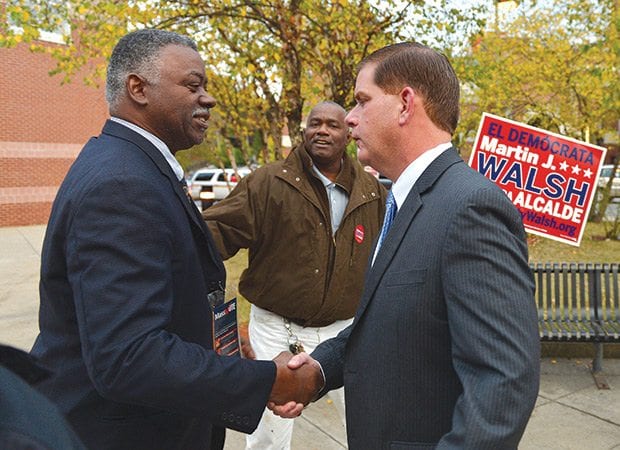Blacks, Latinos split support between John Connolly, Marty Walsh in Boston mayor’s race


City Councilor John Connolly greets businessman Clayton Turnbull at a recent campaign event.
The mad dash that’s taken candidates John Connolly and Marty Walsh to seemingly every corner of the city has given Boston residents multiple opportunities to meet them. And Ron Armstead has met both.
But like some in Boston’s black community, Armstead still hasn’t made up his mind.
Standing outside the VFW Post on Morton Street in Dorchester, Armstead has just digested an hour’s worth of Walsh’s agenda for providing better services and better opportunities to veterans. Earlier that evening at an NAACP Boston Branch meeting, he heard City Councilor Tito Jackson extolling Walsh’s virtues.
And Connolly, who has been equally aggressive in pursuing the black vote, also appeals to Armstead.
“There’s something that can be said for a guy who’s got his kid in a school two blocks from my house,” says the Vietnam vet, referring to the Trotter School, which Connolly’s daughter attends.
Still, Armstead hasn’t made up his mind. He’s too preoccupied with what happened, and what didn’t happen in the September preliminary.
“I’m still suffering from the fact that we haven’t figured out how to win the mayor’s seat in a city where we’re majority people of color,” he says.
Armstead’s split feelings are indicative of where black and Latino voters are at in the mayor’s race — divided between both candidates, with one poll showing Connolly maintaining a 10-point lead among blacks.
This may well be the first race in recent history where black voters have not lined up solidly behind one candidate — like Menino who consistently received more than 80 percent of the black vote or Mel King, who received more than 90 percent.
The split support is not limited to people of color. The Boston Globe reported Monday that Connolly’s own internal polling shows a statistical dead heat between the two candidates.
Connolly supporters in the black and Latino communities cite his commitment to school reform and small business development and his willingness to work on constituent issues in their neighborhoods.
“He’s been known to folks in the black community,” says social worker and political activist Dan Janey, who lives in Roxbury. “A lot of folks in Roxbury vote more on personal interaction. Connolly’s been in the community for different events. His daughter is at the Trotter School, so he’s interacted with a lot of parents.”
Walsh’s supporters, too, cite long-term relationships and the Dorchester representative’s commitment to progressive causes. Those relationships in part have earned him endorsements from every black and Latino elected official who has weighed in on the race, endorsements from former black and Latino elected officials, including Mel King, and members of the Legislature’s Progressive Caucus.
Endorsements aside, you can forgive Armstead and the other 14 percent to 17 percent of voters who remain undecided in the race. Line the candidates up on issues — support for casinos, lifting the cap on charter schools, increasing diversity in the police department — and their stances are nearly indistinguishable.
That was what a group of black, Latino and Asian activists determined when mulling an endorsement in the race. In the end, the group, called Right to the City Vote, picked Walsh because he made more concrete commitments than did Connolly, according to Mariama White Hammond, a member of the coalition.
“Connolly gave us a broad vision, but was weak on the details,” she says.
Still, White Hammond acknowledges that as the campaign has progressed, the differences between the candidates haven’t become any easier to discern.
“They’ve shifted so much,” she says. “It feels like they’re more and more the same. It comes down to a question of trust.”
For some, Walsh’s longstanding connection to unions stands out as an impediment to trust. Connolly has hammered away at the legislation Walsh filed year-after-year that would have taken away the City Council’s power to reject public employee contracts and given an arbitrator final say.
Others in the black community look askance at Walsh’s leadership in the building trades, which for long have had a reputation for being unwelcoming to black and Latino workers.
On the other hand, Connolly’s call for a return to neighborhood schools raised eyebrows in the black community, where shortages of quality schools and a net deficit of seats has made busing the only option for many black and Latino families.
Both candidates have endeavored to move out of their respective bases — Connolly in the predominantly white wards in West Roxbury, Charlestown and East Boston and Walsh in the predominantly white wards of Dorchester and South Boston.
Both have made similar sets of campaign promises to the black, Latino and Asian voters who inhabit the vast swath of the city that separate their respective bases: a mayoral administration that reflects the diversity of the city at its highest levels, longer school days and increased resources for the city’s schools, support for minority- and woman-owned businesses.
With the candidates locked in a dead heat, in the end the race could hinge on any number of factors — foul weather that favors Walsh’s massive get-out-the-vote machine, a late surge from Connolly’s television advertisements, which have been hitting the airwaves.
Whichever way the race is decided, it appears as though the black community has its bases covered with supporters active in both campaigns. Candidates of color may not have been able to break past the white candidates in the preliminary, but black and Latino voters remain key constituencies in the final stretch.







